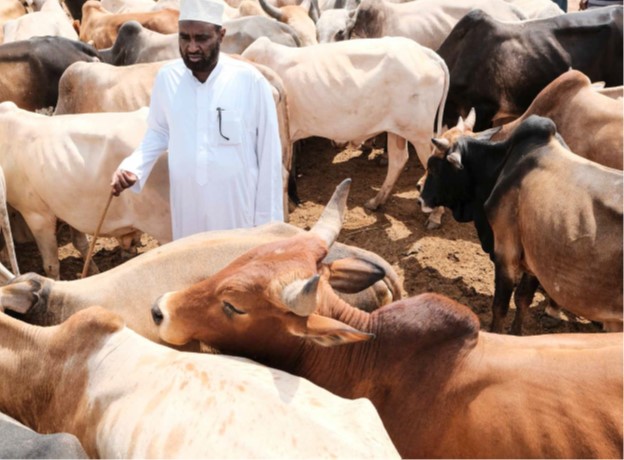Trade in livestock and livestock products can brinq creat benefits but also substantial risk to animal and human health. The Horn of Africa reqion is rich in livestock, and livestock trade-export is one of its economic success stories. Annual exports from the Horn and neiQhbourinQ countries are estimated at close to USO 1 billion. The destination market is mainly the Arabian Peninsula and is heavily concentrated curnq the annual Haj season. The trade also contributes to a larue import business as many export traders either sell toreicn exchanqe to importers or themselves import food, clothes and other products throucn Somali and other ports. Expandinq and safeQuardinQ this trade is, hence, a development imperative.
In December 2019, Member States of the African Union, Regional Economic Communities, Experts, Implementing and Development Partners and Commodity Producer Associations, Representatives of Research and Training institutions and relevant industries came together in Accra, Ghana to accelerate animal trade within Africa and globally. They identified transboundary animal diseases and adhering to SPS and animal welfare standards as critical for vibrant trade and called for initiatives to safeguard and promote trade.
This feasibility study, commissioned by the World Organisation for Animal Health (OIE), answers that call and also aligns with important initiatives including the African Continental Free Trade Area (AfCFTA), Comprehensive African Agricultural Development Programme (CAADP), Malabo Declaration on Accelerated Agricultural Growth and Transformation for Shared Prosperity and Improved Livelihoods, Development Strategy for Africa (LiDESA).
At its core is a proposal to transform approaches to trade, harnessing advances in communication and big data, novel technologies for disease reporting and management, public-private partnerships, and multi-stakeholder approaches to build trust in trade between the Horn of African and the Arabian Peninsula. The evidence-based feasibility study has been developed with and validated by a wide range of stakeholders through a series of meetings, missions, field visits and workshops.
The proposal is located with the framework of the Agreement on the Application of SPS Measures (the «SPS Agreement») entered into force with the establishment of the World Trade Organization (WTO) on 1 January 1995. The SPS Agreement restricts members from the use of unjustified SPS measures but allows legitimate measures to reduce risk from importation. The World Animal Health Organisation (OIE) codes set out legitimate SPS measures and is recognised by the WTO as international reference point for standards related to animal health.
We believe the BESST (Better Enforcement of Standards for Safer Trade) initiative, based on innovation, evidence and participation, can contribute to the safe and sustainable transformation of trade in livestock and livestock products across the Red Sea.
